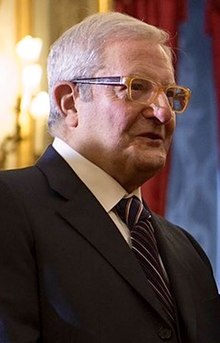Loading AI tools
Italian politician From Wikipedia, the free encyclopedia
Augusto Antonio Barbera (born 25 June 1938) is an Italian judge and former constitutional law professor at the University of Bologna. In his political career he was member of the Chamber of Deputies between 1976 and 1994 for the Italian Communist Party and later the Democratic Party of the Left. In 1993 he served shortly as Minister without portfolio for relations with Parliament in the government of Prime Minister Carlo Azeglio Ciampi. Barbera has been Judge of the Constitutional Court of Italy since 21 December 2015 and its President since 12 December 2023.
Augusto Antonio Barbera | |
|---|---|
 | |
| President of the Constitutional Court of Italy | |
| Assumed office 12 December 2023 | |
| Preceded by | Silvana Sciarra |
| Judge of the Constitutional Court of Italy | |
| Assumed office 21 December 2015 | |
| Appointed by | Italian Parliament |
| Preceded by | Sergio Mattarella |
| Minister for Parliamentary Relations | |
| In office 29 April 1993 – 4 May 1993 | |
| Prime Minister | Carlo Azeglio Ciampi |
| Preceded by | Egidio Sterpa |
| Succeeded by | Paolo Barile |
| Member of the Chamber of Deputies | |
| In office 5 July 1976 – 19 June 1979 | |
| In office 30 June 1982 – 14 April 1994 | |
| Personal details | |
| Born | 25 June 1938 Aidone, Italy |
| Political party | PCI (until 1991) PDS (1991-1998) DS (1998-2007) PD (since 2007) |
| Alma mater | University of Catania |
| Profession | University professor |
Barbera was born in Aidone on 25 June 1938.[1] He obtained a degree in Jurisprudence with a specialization in constitutional law. Between 1967 and 1969 he worked abroad as a researcher at the universities of Karlsruhe and Heidelberg.[2]
Barbera was a lecturer of constitutional law at the University of Catania from 1969 to 1970. He then took up similar position at the University of Ferrara, where he would remain until 1977. In that latter year he started working at the Institute of Public Law of the faculty of political science of the University of Bologna. He stopped working there in 1994.[2] He was a professor of constitutional law at the University of Bologna.[2] He took up emeritus status in 2014.[3]
In 2013 Barbera was named as one of 35 academics in a commission on constitutional reform under Prime Minister Enrico Letta.[4][5]
Barbera is a corresponding academic of the Academy of Sciences of the Institute of Bologna in the section of law, economics, and finance.[2]
Barbera took up political office in 1976, when he was elected to the Chamber of Deputies for the Italian Communist Party. He would stay member of the Chamber until 1994. When the Communist Party dissolved in 1991, he stayed member of its successor party, the Democratic Party of the Left. From 1987 to 1992 Barbera served as president of the parliamentary committee on regional questions.[6]
On 29 April 1993 Barbera was one of three former Communist Party politicians named in the new Ciampi Cabinet; the other two were Vincenzo Visco and Luigi Berlinguer.[7] Barbera was made Minister without portfolio for relations with Parliament. It was the first time in 46 years that former Communist Party politicians were made part of the cabinet.[7] Several hours after being officially named in the government, a rupture broke in the coalition over the handling of charges in Parliament against former Prime Minister Bettino Craxi. The Ministers of the Democratic Party of the Left, to which Barbera belonged, resigned.[8][9] His replacement, Paolo Barile, took office on 4 May.[10]
On 16 December 2015, the Italian Parliament elected three candidates to the Constitutional Court of Italy: Franco Modugno, Giulio Prosperetti and Barbera. The election was realized after 31 previous failed attempts.[11] Barbera was the candidate of the Democratic Party, he obtained 581 votes in favor.[6][12] He was sworn in five days after his election.[1]
Seamless Wikipedia browsing. On steroids.
Every time you click a link to Wikipedia, Wiktionary or Wikiquote in your browser's search results, it will show the modern Wikiwand interface.
Wikiwand extension is a five stars, simple, with minimum permission required to keep your browsing private, safe and transparent.